Well, this started as a short article on some common everyday words you’ll hear specifically in Australia, and it’s now much longer than I’d expected. I’ll edit and update this next year but for now here’s a list to get us started!
Shopping Vocabulary
A bottleshop (above right) is the place to go if you want to buy beer, wine or any other type of alcohol. They have other products too in case you’re looking for some snacks for a get-together at home. Not only that, but there are also drive-through bottleshops! So a country with strict laws regarding drink-driving makes it perfectly normal to buy alcohol from the comfort of your own car..
You can buy medicine, body care and hygienic products at your local pharmacy or chemist. Please note that the word drugs usually refers to illegal drugs in Australia (whereas Americans will include prescription medicine in the term drugs).
A milk bar is the shop usually in neighbourhood streets that sells milk, soft drinks, bread and other food items, as well as the daily newspapers.
A newsagent is where you can buy newspapers, magazines, cards and office stationery. Some newsagents may also sell public transport tickets – look out for the public transport logo as you walk in.
An op shop or opportunity shop is another way of saying charity shop or goodwill, where you can donate your clothing and books to charity, or pick up a bargain. Opportunity shops are in most shopping strips and the quality of clothing is pretty good: during the boom many people donated lots of items, sometimes barely ever worn.
Getting Your Mobile & Internet Sorted
Once you arrive in Australia you’ll probably want to find out what plans the major operators have on offer. In Australia you can choose from different bundles (= plans) among major providers such as Telstra, Optus and Vodafone.
Please note that mobile and internet charges are incredibly expensive so make sure you check how much you’re paying and what you can expect to get with your bundle. You’ll often hear operators mention data – this is how much in terms of GB (gigabytes) you can use within a given month. It’s important to know how much you’re consuming as watching YouTube videos will eat up a lot of data compared to just checking your email accounts.
Also, on this note, don’t expect to find wi-fi in every cafe you go to like in other countries. Ask first if they have wi-fi before you order.
If you don’t want to have home internet or a mobile plan, you can pay as you go (ie have a pre-paid plan). For this you’ll buy a voucher to top up each time you need more credit.
Key Shopping Phrases
Assistant: “Were you after anything in particular”?
Shopper: “No thanks, I’m just browsing” = “I’m just having a look.”
Assistant: “Well, if you need anything, just give us a shout.”
Other ‘Shopper Phrases’:
“I’m after | looking for …a pair of jeans…”
“Do you have this in a smaller | bigger size?”
“I was wondering if you could help me…”
Food And Drink
Capsicum in Australia is what Brits and Americans refer to as pepper:
As you can see in the photo up top, we have fish and chip shops just like in the UK. We also use the word chips for long, thin pieces of fried potatoes which are eaten hot. Fries are usually thinner, such as what you might find at McDonald’s. These days some fish and chip shops have top quality meat, and also offer burgers and some vegetarian options. Go easy on the salt and vinegar!
Packaged cold chips are what Brits refer to as crisps.
A cold one is another way of referring to a bottle of beer (eg “Hey mate, while you’re in the kitchen can you get me a cold one..?” You might hear beer being called a tinnie (slang).
An esky is a container used to put cold food and drinks in while you’re spending time outside, such as going to the beach or the cricket. Americans call it a cooler.
Icy poles (photo below) are nice at the end of a hot summer’s day, especially for the kids. You can buy them from supermarkets or your local milk bar or even make your own:
Lollies are what Brits refer to as sweets and Americans call candy. I remember going to the milk bar after school with my grandparents and getting a $1 mixed bag of lollies 🙂
Self-raising flour (US. self-rising) is used to bake cakes and bread and rises in the oven.
Soft Drinks include all your favourites, such as Coke and Pepsi, to make sure you get 25 teaspoons of sugar into you. If you see lemonade on the menu in a cafe it might mean Sprite or 7-Up, so ask first if you want real crushed or homemade lemonade made from real lemons.
Takeaway food is what you can buy and take away with you (US food to go).
Life Outdoors
Togs, Cossies, Bathers, Boardshorts..and Thongs
If you want to hit the beach, you’ll usually wear bathers or swimmers. Some Aussies call the clothing you wear at the beach a cossie, especially for women. Guys usually wear boardshorts, as in the photo above. Older Australians still call bathers togs.
Some sporty guys, such as lifesavers, wear speedos. These are sometimes jokingly called budgie smugglers. Our former Prime Minister was famous for wearing them:
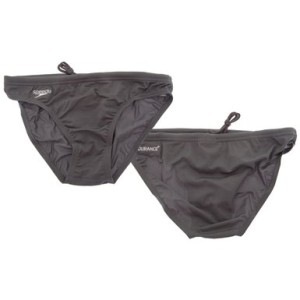 Thongs are what you wear on your feet (USA flip-flops):
Thongs are what you wear on your feet (USA flip-flops):
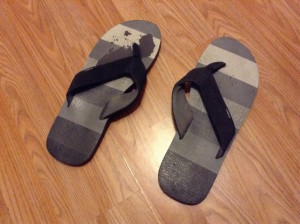
In the USA and Britain a thong is this (in Australia it’s a G-string):
At the beach don’t forget to slip, slop, slap: slip on a shirt, slop on some sunscreen, and slap on a hat. The Australian sun can be harmful if you don’t take care and cover up, especially if you have sensitive skin!
A tracksuit is loose-fitting clothing that includes both pants and a top. You usually wear it while you’re at the gym or jogging along the beach before it gets too hot.
A singlet is like a T-shirt, but without sleeves (ie a sleeveless top). You’ll see people wearing singlets when it’s very hot.
Beach cricket is a version of cricket that you’ll see friends and family play on the beach, with modified rules.
The footy usually refers to Australian Rules Football.
At Home
A doona is what the Brits refer to as a duvet: it’s a large piece of bedclothing designed to keep you warm, especially friendly to allergy sufferers.
Types Of People
An ankle biter is a word for a small child (it’s quite a colourful term, as you can imagine a child can only bite adults’ ankles).
A battler is a word to describe Aussies who are working class or everyday people who are dealing with the challenges of paying the rent, dealing with the high cost of living and so on. In a way this word is used in a more empowering manner compared to the ‘victim syndrome’ you hear in American politics to describe the less well-off. In Australia conservative Prime Minister John Howard won the 1996 election in part because he persuaded the working class that he’d better look after them than Labor, who they’d usually vote for. John Howard is quoted as saying this about battlers:
The battler is somebody who finds in life that they have to work hard for everything they get… normally you then look at it in terms of somebody who’s not earning a huge income but somebody who is trying to better themselves, and I’ve always been attracted to people who try to better themselves [sourceThe Age]
A bloke is another word for guy.
A bludger is someone who doesn’t work much, who’s lazy and lives off others. Some in the media have called people on unemployment benefits as dole bludgers.
A bogan is the Aussie with a very broad accent who others consider uncultured. Bogan culture can be a bit like white trash in the USA, but in Australia the term is more broad and covers different types. For example, a few bogans might be a bit racist, but often times they’re the real dinky-di Aussie who doesn’t like authority, who wants to have a beer and a laugh with mates. A bogan wears his heart on his sleeve – what you see is what you get. Think of the late Steve Irwin or Paul Hogan in Crocodile Dundee. Or cricketer Shane Warne in the 1990s. They do swear a lot, but they’re the opposite of the hipsters – they really don’t care much about material things and are less pretentious. However, it’s true that some bogans are really poorly behaved and some get into trouble with the police.
A boganaire is a new word for the bogan or working class who made a lot of money during Australia’s 2000’s economic boom. Some plumbers make over $100,000 a year and now they’re cashed up!
A bush pig is another funny term (though feminists won’t think so). It’s an unattractive woman living in the country.
A crook is someone who is dishonest. I remember my grandparent once told me he had problems getting his lawn mower repaired. After it broke down yet again, he said: “I’ll have to take it somewhere else, that bloke’s a crook.”
A dickhead means idiot. I’m sure there are many others but this one is quite common! Dipstick and tool are synonyms.
The word feral is appearing more in the media now to refer to the absolute worst among uncultured people. This word is definitely negative. Ferals are said to be of lower socio-economic background and live in the outer part of a city or town.
A hipster is someone around 20-35 who tries to dress cool and be different and show that they’re not as interested in material things. These days they have a beard and wear black jeans and a checkered shirt. What’s the difference between a metrosexual and a hipster? I think that metrosexuals openly show that they want to look good, whereas a hipster ‘pretends’ to show he’s not interested in how he looks. Well, you decide – they’re to be found all over the inner areas of Australian cities (eg in St Kilda, Fitzroy and Richmond in Melbourne).
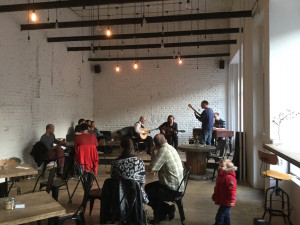
A hoon or goon is a bit like a hooligan or lout. Someone often in their teens or twenties who behaves badly or carelessly.
A larrikin is a very Aussie word, usually for a man who has a cheeky sense of humour and likes to be a bit of a bad boy. But deep down he’s cool.
A no-hoper is someone who will not be successful, who has no hope of doing well in life.
Rellies are your relatives: “I’m going to pop over and see the rellies on Saturday..”
A sook is someone who gets upset easily over nothing and who is very sensitive.
A whinger or whiner is someone who complains a lot about something (eg “That Joe is such a whiner, everytime I talk to him he’s complaining about this or that.”
A wuss is a coward.
Summing Up
This is really just a taster. It’s the first time in ages I’ve focused on English in Australia, and it’s reminded me how colourful the language can be. A lot of Aussies don’t take themselves too seriously, and I think this comes out in Aussie slang.


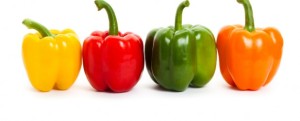
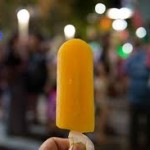
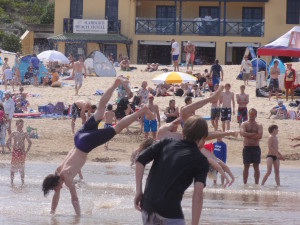
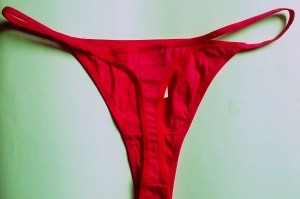
Leave a Reply